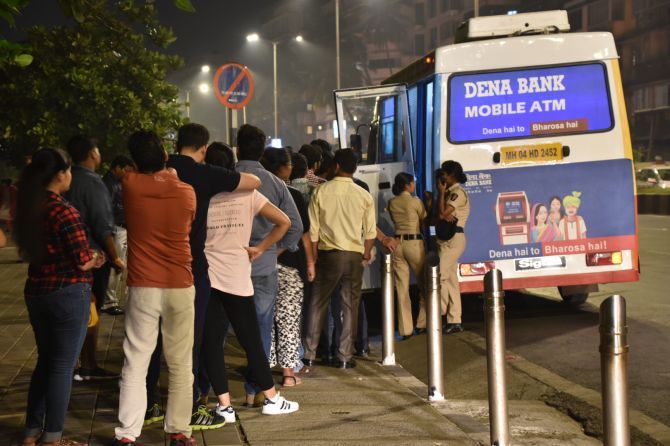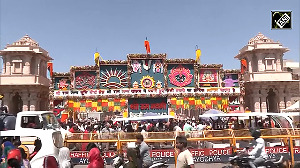This was among the few times that TCS had to deploy rapid application development mode, which means changes in the application happen on-the-go.
Shivani Shinde Nadhe/Business Standard reports from Pune.
 Tata Consultancy Services, India's largest IT services provider which works with nearly 100 banks including the Reserve Bank of India and the State Bank of India, has spent the past 20 days working round-the-clock to make the tech process smooth to manage the impact of demonetisation.
Tata Consultancy Services, India's largest IT services provider which works with nearly 100 banks including the Reserve Bank of India and the State Bank of India, has spent the past 20 days working round-the-clock to make the tech process smooth to manage the impact of demonetisation.
Several brainstorming sessions with banks were held to forge innovative solutions, which would make the life of a banking consumer slightly easier.
One of them is the 'queue-buster.'
Although it's in the pilot stage, this will bring much relief to the people standing for hours in queues to withdraw cash.
"The idea is to have pre-configured teller booths. So, instead of one or two long queues, there will be five-to-six counters that will be disbursing the set limit of cash. This could be Rs 1,000, Rs 2,000, Rs 5,000, Rs 20,000 and so on. It is easy to manage the cash outflow. We have piloted it in some branches of a bank," said Ravi Vishwanathan, president (growth market business) at TCS.
Another idea which came out during one of the brainstorming sessions was having handheld devices and the experience is similar to check-ins done via such devices at airports.
"All the documentation needs are done at the entry itself and you just have to go and get your cash. This should get rolled out soon," said Vishwanathan without divulging the name of the bank.
Having TCS CEO and Managing Director N Chandrasekaran on the RBI board hasn't helped the company in terms of preparedness.
Vishwanathan, like millions of Indians, came to know of demonetisation only when Prime Minister Narendra Modi addressed the nation on November 8.
Vishwanathan, who had been fielding calls from customers on a daily basis, was ready with a crack team of 10 to 15 people on the morning of November 9 looking into how the company could help client banks.
This was also among the few times that the company had to deploy rapid application development mode (RADM) -- which means changes in the application happen on-the-go and there is no time to send the changes for approval to the client.
"This will happen across the table. We had to deploy RADM for both changes at the back end which will be the core banking system as well as the front end that would be ATMs and micro-ATMs," he added.
The immediate concern, according to Vishwanathan, was to have systems in place that would handle currency exchange.
This included enabling bank ATMs and preparing the back end to manage the cash deposits as well as withdrawals so that the systems are not modified frequently, and working with business correspondents on how their machines manage the load.
One important change the teams had to make was on cash withdrawals.
With the RBI changing withdrawal limits a few times, banks did not have time for a code change to take place at the back end.
'We made sure the limit change could be done with the click of a button or minimal configuration. We only had to redo it when the limit was changed for marriage withdrawals as the system needed other documents to be attached," said Vishwanathan.
TCSers also made available a reporting system for banks that allowed the details of currency transaction and cash outflows on mobile handsets.
Management reports were made available on a daily and hourly basis on cash-transaction analysis, high currency note exchanges, and total deposits, among others.
In the case of the RBI, for which TCS manages the integrated currency exchange, the team had to monitor the currency position and provide a daily report to the governor that is also shared with the Prime Minister's Office.
Along with managing the software needs and application updates on a real-time basis, TCS also managed to help Bank of India roll out 80 additional ATMs, while handhelds were rolled out at Indian Overseas Bank.
"We were able to roll out the software changes required for the system pretty fast. Even for ATMs, the software change was very smooth but the hardware recalibration took time," Vishwanathan added.
Demonetisation, Vishwanathan believes, will throw up many more opportunities for the IT players in India.
"Almost every bank has a mobile wallet option. Plus, there is the unified payment interface (UPI). What will be important to see is how the merchant ecosystem adapts to this," he said.
"Their adaptability will be key as cash transactions are the highest at the retail level," he added. "As a company, we have always been looking at how we can increase our exposure to the retail side of the banking business. This will be an opportunity for us."
IMAGE: A Mobile ATM at Marine Drive in Mumbai, November 12, 2016. Photograph: Sahil Salvi.












 © 2025
© 2025